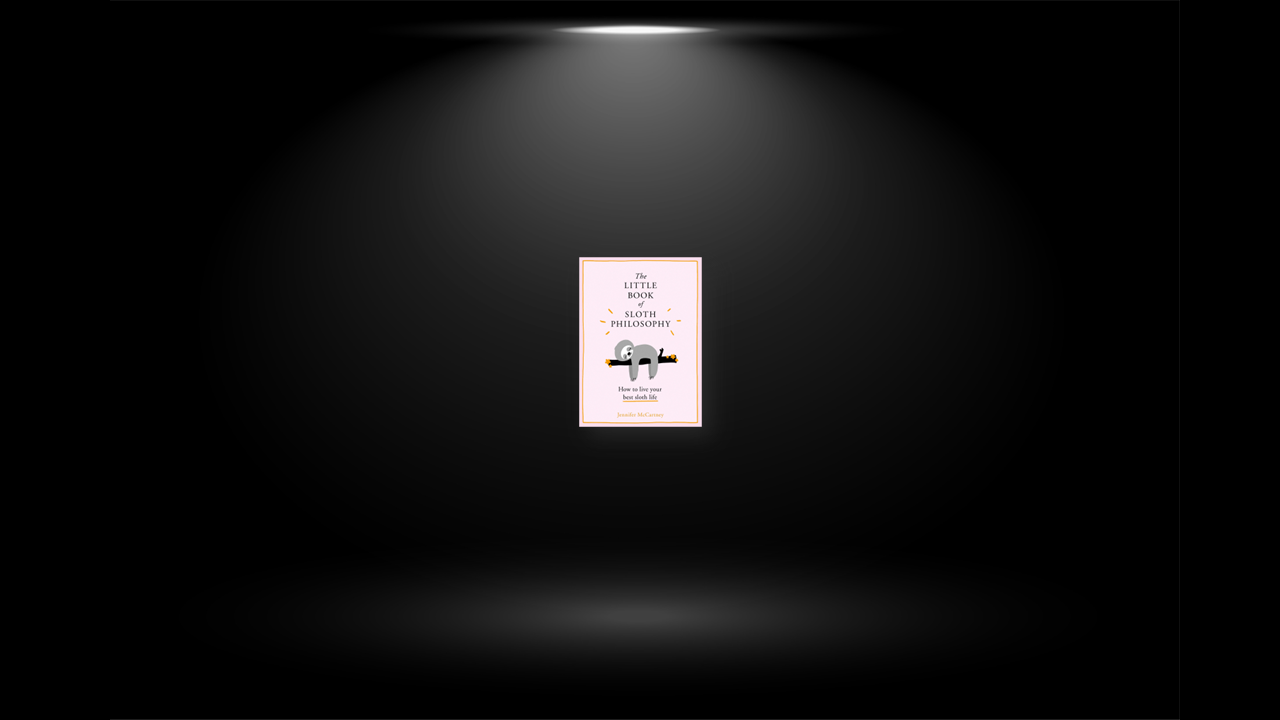Welcome to the Sloth Philosophy
Slow down. Hold your horses. Chill out. Don’t run on the pool deck. We’re constantly being encouraged to embrace stillness. Slowness. Mindfulness. And with good reason. Science has proven that slowing down has loads of advantages – from helping to manage chronic pain to increasing happiness levels and decreasing feelings of stress.
Yet we’re often shamed when we take time for ourselves. Appearing lazy is a cardinal sin in our highly strung society. (It’s also one of the seven deadly sins. If that’s an issue, this book is definitely not for you.)
Sloths are mindfulness in action. They’re contemplative, deliberate, relaxed and focused. They aren’t concerned with politics, or who drank the last of the milk, or how many steps they logged on their fitness tracker. They don’t really stress about anything. Live slow, die whenever is their motto. They’re wonderful animals. They resist the urge to be productive and the social pressure to be more successful. They’ve also been on this planet for tens of millions of years – a testament to the wisdom of their way of life, no? They must be doing something right. And now you, too, can live slothfully by embracing the sloth philosophy. It’s a simple mindset and a wonderful way of life – and it doesn’t take much to begin living the way of the sloth. In fact, you’ll be pleased to learn, it takes very little effort. Which is a key part of the sloth philosophy.
Follow the SLOW Method for a More Slothful Life
The mantra of the sloth philosophy is slow down. To help ease yourself into this world, try following the SLOW method, outlined here. These four simple tips will help you become the best, most slothful version of yourself.
S
Sleep in. The world has a bizarre obsession with policing the amount of sleep we all get. On the one hand, we are being told how important it is, but on the other, being sleep deprived is sometimes even seen as a badge of honour. Oh, she runs her own company and only needs four hours of sleep a night. Let’s give her an award that she’s too exhausted to enjoy! But what if you sleep for, say, 12 hours? It’s too much. You’ll get some sort of laziness disease. Why fetishise sleeping in? Just do it. Sleep is good for you. Dreaming is good for you. It’s great for your skin and your immune system – and your emails can wait another hour or two while you pay homage to the duvet gods.
L
Leave your phone at home. This may seem obvious, but the idea of leaving your phone at home may also give you an anxiety attack. How will you find your way to the nearest Starbucks without your GPS? Trust me, you’ll find one. We’re all too plugged in. Too much screen time is ruining our brains and expanding our waistlines. Not looking at your phone every four minutes is better for you. But it’s also really hard to do. So to start, try leaving your phone at home the next time you pop out to the shops or run across the street for a flat white. See how it feels to be without your pocket technology for five minutes. Ten minutes. And over a period of days or weeks, work your way up to a couple of hours. The notifications can wait until you get back – and for those few minutes or hours take a deep breath and enjoy not being 100 per cent available and on call to the entire universe. If you can’t bear to leave your phone at home, try putting it on flight mode. You know, like you’re supposed to do on aeroplanes before they take off, so your Wi-Fi doesn’t bring down the plane.
O
Opt out. Embracing the way of the sloth requires an attitude adjustment. Make a choice to opt out of the idea that you need to be busy, engaged, connected and productive at all times. It’s just fine to be unproductive every so often. In fact, the sloth philosophy believes it’s essential to good mental health. Opting out on a practical level simply means doing less of the things you don’t want to do. Life comes with a lot of obligations, sure, and some of them are necessary for your own wellbeing or that of your loved ones. This includes things like feeding the cat or paying your rent. But we also commit to a lot of things we don’t necessarily want or need to do. Part of slowing down and embracing the sloth philosophy is realising you don’t have to do everything or be all things to everyone. Being busy isn’t a badge of honour if you’re miserable.
W
‘What’s the rush?’ Repeat this phrase when you’re feeling overwhelmed or stressed out. Ask yourself whether something really needs doing immediately. Are you ignoring your own needs in order to do it? If you are about to take a rejuvenating walk in the spring sunshine, but get a text message from your accountant asking about a missing file which causes you to check your email where you see a note from a friend asking about your plans for visiting the countryside tomorrow which you start to reply to but first you need to research that art gallery you heard about so you can include the link in your reply and then it’s an hour later and somehow you’ve bought four pair of shoes from ASOS (also that reminds you that before your trip you need to wash your sneakers, throw out the rotten fridge lettuce and call the school) … you need to rethink your priorities. Take a step back. Try and put any feelings of urgency into perspective. Remember our collective past when our grandparents sent paper letters to their friends and family via boats? Catching up with each other took weeks. And they all survived. Take a breath. Vow to do it later. Or tomorrow. If at all. Will anyone or anything suffer if you take that walk first?
Famous Followers of the Sloth Philosophy
DOUGLAS ADAMS: Douglas Adams came up with the idea for the title of The Hitchhiker’s Guide to the Galaxy while lying drunk in a field – not the first time being drunk or taking a nap has paid off, so let this be a lesson to us all. He was also notoriously bad with deadlines, saying, ‘I love deadlines. I love the whooshing noise they make as they go by.’ The author’s book editor reportedly once spent three weeks locked in a hotel room with him to ensure he wrote and delivered the manuscript for So Long, and Thanks for All the Fish. He even recalls doing very little work at university – com-pleting three essays in as many years. He graduated nonetheless, and went on to become one of England’s most successful and best-known authors – all at his own pace.
LEONARDO DA VINCI: Guess how long it took famous sloth-philosophy hero da Vinci to finish the Mona Lisa? (Keep in mind the painting is only 21 by 30 inches.) A year? Three years? Scholars think it could have taken as many as fifteen. For the purposes of comparison, keener Michelangelo took just four years to paint the entire Sistine Chapel. Today, few of us care how long it took anyone from history to do anything – all that matters is that eventually, when they felt like it, they did it. Da Vinci also took 25 years to complete a seven-month commission – his first payment for Virgin of the Rocks being received in 1483 and the final one in 1508. And what was he doing with all that downtime? Doodling. Inventing the helicopter and the parachute and the tank.
LORD MELBOURNE: Lord Melbourne was by all accounts an unexceptional English prime minister. He didn’t oversee any wars or enact any notable policies. He’s mostly remembered for his extramarital affairs while in office and for his close relationship with Queen Victoria. Doing nothing was his default position. ‘Why not leave it alone?’ was his mantra (along with the words ‘delay’ and ‘postpone’). He was a man who served in his job adequately – we can all aspire to that.
Life is Short – Spend it Doing Things You Love
In conclusion, none of us is guaranteed a set amount of time on this earth. Really, it’s a miracle we are here at all. In 17th-century England the average life expectancy was just 35. If you survived childbirth, you could expect to perish from disease or overwork or a gruesome accident. Today we’ve got it a bit better but, of course, it’s all up to chance and luck – we never know what’s in store for us. So take a leaf from the sloth tree of life and make the most of your time on earth. Spend it doing the things you love – sleeping, hanging out, bringing joy to others. Whatever you want! It’s your life.


